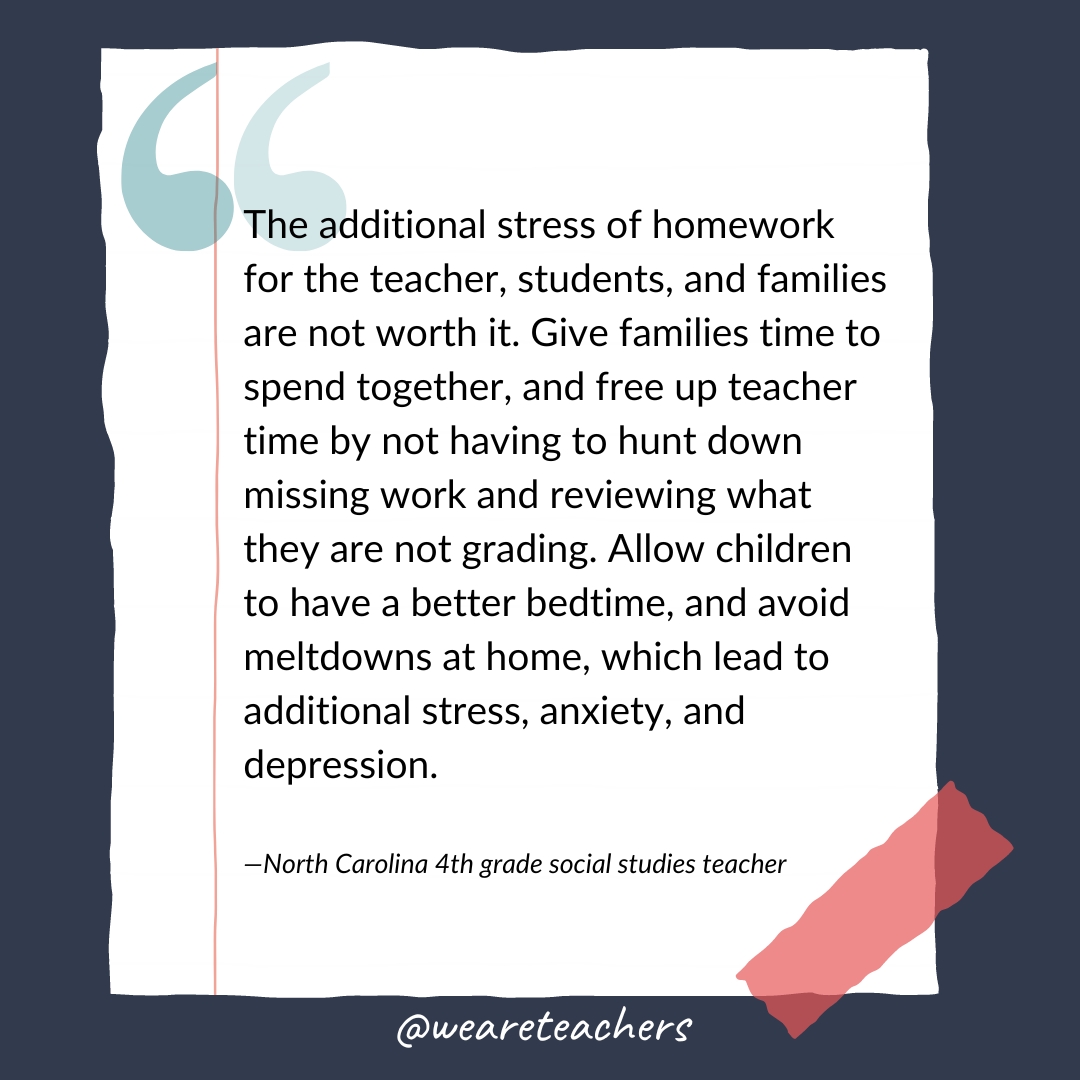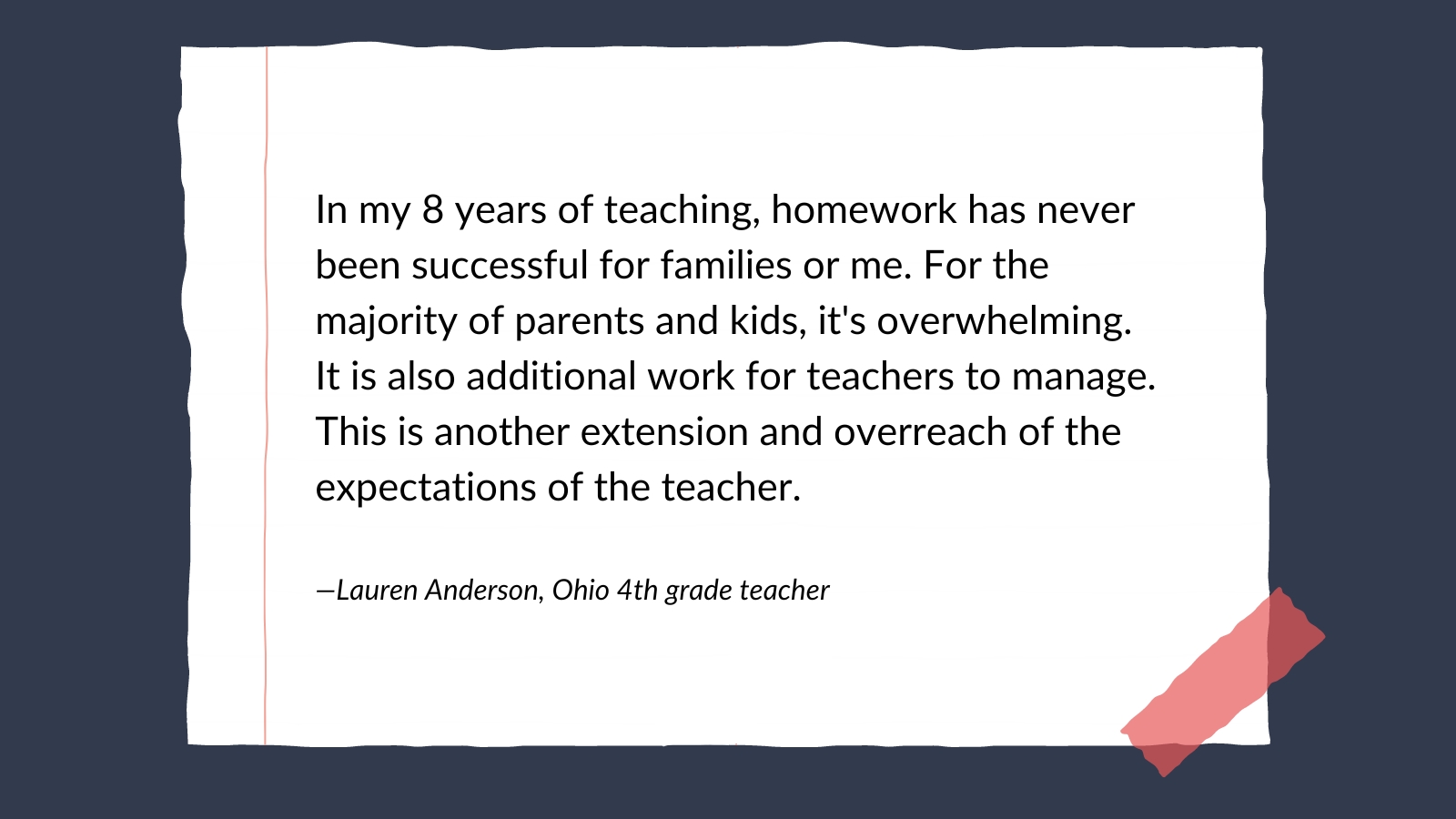Every kid dreams of it: “Homework banned forevermore!” For as long as anyone can remember, homework has just been one of those things kids have to do because it’s good for them, like eating their vegetables. But is it really as important to do hours of homework every night as it is to eat broccoli and carrots? New research suggests homework might not have a whole lot of value. This leads to a big question: Should we ban homework?
“I think parents already have enough stress just in providing for their families!” says one Arizona 1st grade teacher. “I can imagine one more chore of having to sit down and do homework with their child would add that much more stress. Kids don’t like doing homework, so it frustrates them, which in turn frustrates parents. They spend time fighting about homework that they could be spending quality time over a board game or family meal!”
We wanted to know more, as every educator should. So, we combed through recent research to see what experts say, and explored the news to see what schools in the United States and abroad have tried. Plus, we asked 40+ active K-12 educators to share their thoughts. Here’s what we found out.
Does homework actually work?
This is one of the biggest questions people have around homework bans. Is it worth the time students are spending on it? How many kids actually do it consistently? How involved do parents need to be? In short: Does homework have value?
What the Research Says
Educators first started asking serious questions about homework more than 20 years ago, when an article that evaluated decades of research on homework suggested that it might not be as effective as we thought, at least in the lower grades. But other studies on homework indicate that students who do homework as assigned have higher academic outcomes overall, especially in grades 7 through 12.
What Real Educators Say
Most of the teachers that responded to our survey felt homework (especially for upper grades) does have at least some value. Many, though, were less concerned with academic benefits and more with developing general life skills like time management and responsibility.
- “For older students, reasonable homework that is preparation for class the next day helps students learn how to manage their time, meet deadlines, and take responsibility for their learning. I am a fan of flipped learning—students watch the lesson for homework and then use class time to ask questions, work together, work with their teacher, and do the work.” —Julie Mason, MS/HS English teacher
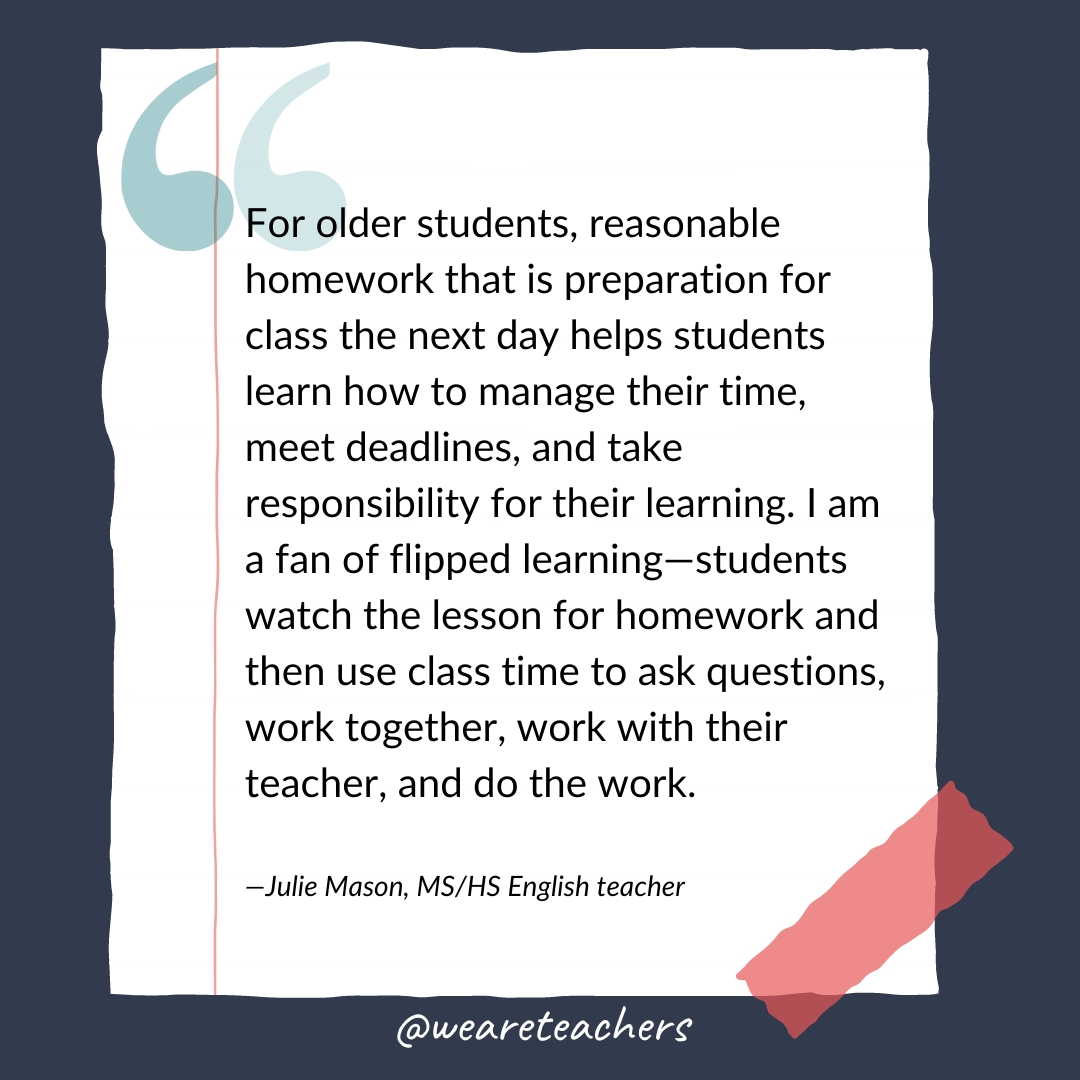
- “In middle school and high school, homework is important because it helps build stamina and potential study habits for college or trade schools.” —Desiree T., elementary teacher
- “Homework is good practice for subjects like math. In other subjects, it is good for reviewing subject matter.” —Ohio 8th grade social studies teacher
- “The proper amount of homework that is relevant to the daily lessons will help reinforce the skill and allow parents to see what their child is learning.” —Joanie B., Texas 4th/6th grade teacher
- “It’s not beneficial; parents today have not been taught how to help with new strategies. They are also often so busy that they cannot be bothered to help so they just give the answers. I saw a lot of this during the pandemic and even after when I would have 1st graders tell me they knew the answer ‘because they just know it.’ Not to mention the students who would actually benefit from having the extra practice of homework oftentimes do not have the support at home.” —Georgia 3rd grade teacher
- “In my 8 years of teaching, homework has never been successful for families or me. For the majority of parents and kids, it’s overwhelming. It is also additional work for teachers to manage. This is another extension and overreach of the expectations of the teacher.” —Lauren Anderson, Ohio 4th grade teacher
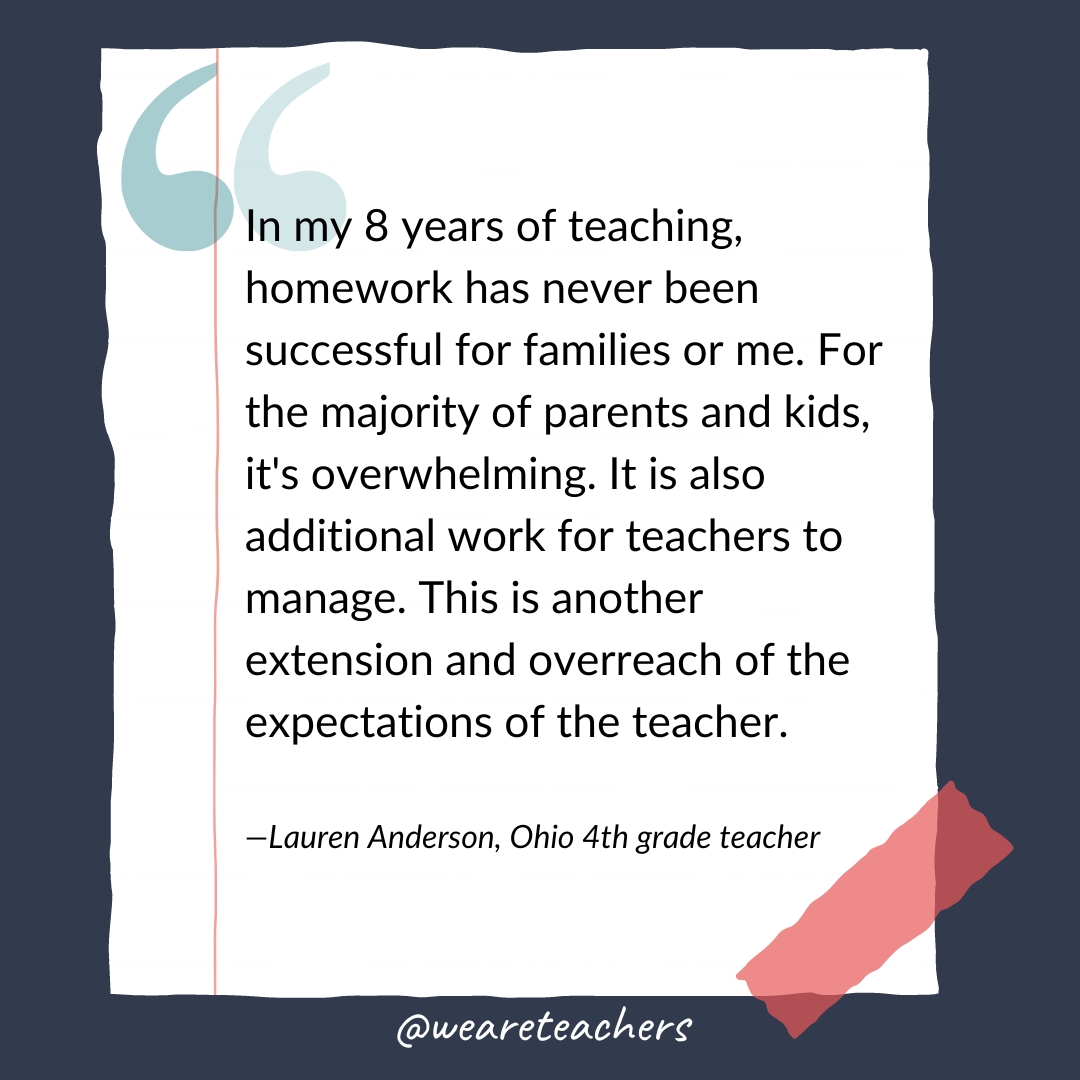
- “Homework isn’t busy work. How will today’s youth become tomorrow’s leaders (or survive college/trades classes) if they aren’t practicing skills to the next level?” —Arizona 1st grade teacher
Should we ban homework in elementary school?
Most adults today didn’t have homework in kindergarten, so they’re surprised when their child arrives home with a backpack full of worksheets. Older elementary students frequently bring home big projects like making a diorama or creating a family tree, something that usually means a lot of parent involvement. Is homework at this age reasonable and meaningful?
What the Research Says
Supporters of a homework ban often cite research from John Hattie, who concluded that elementary school homework has no effect on academic progress. In a podcast he said, “Homework in primary school has an effect of around zero … It’s one of those lower hanging fruits that we should be looking in our primary schools to say, ‘Is it really making a difference?’”
The general wisdom these days seems to point to less homework overall at the elementary level, with one huge exception: reading. The research agrees: kids need to read at home as well as at school. Most educators recommend kids spend at least 20 minutes reading at home every single day.
What Real Educators Say
More than half of our survey respondents (56%) are in favor of banning homework for the elementary grades. They worried about kids not having support or resources at home and taking away their time for creative play or family activities. But some teachers still find value in elementary homework, especially for math and reading, as long as it’s minimal.
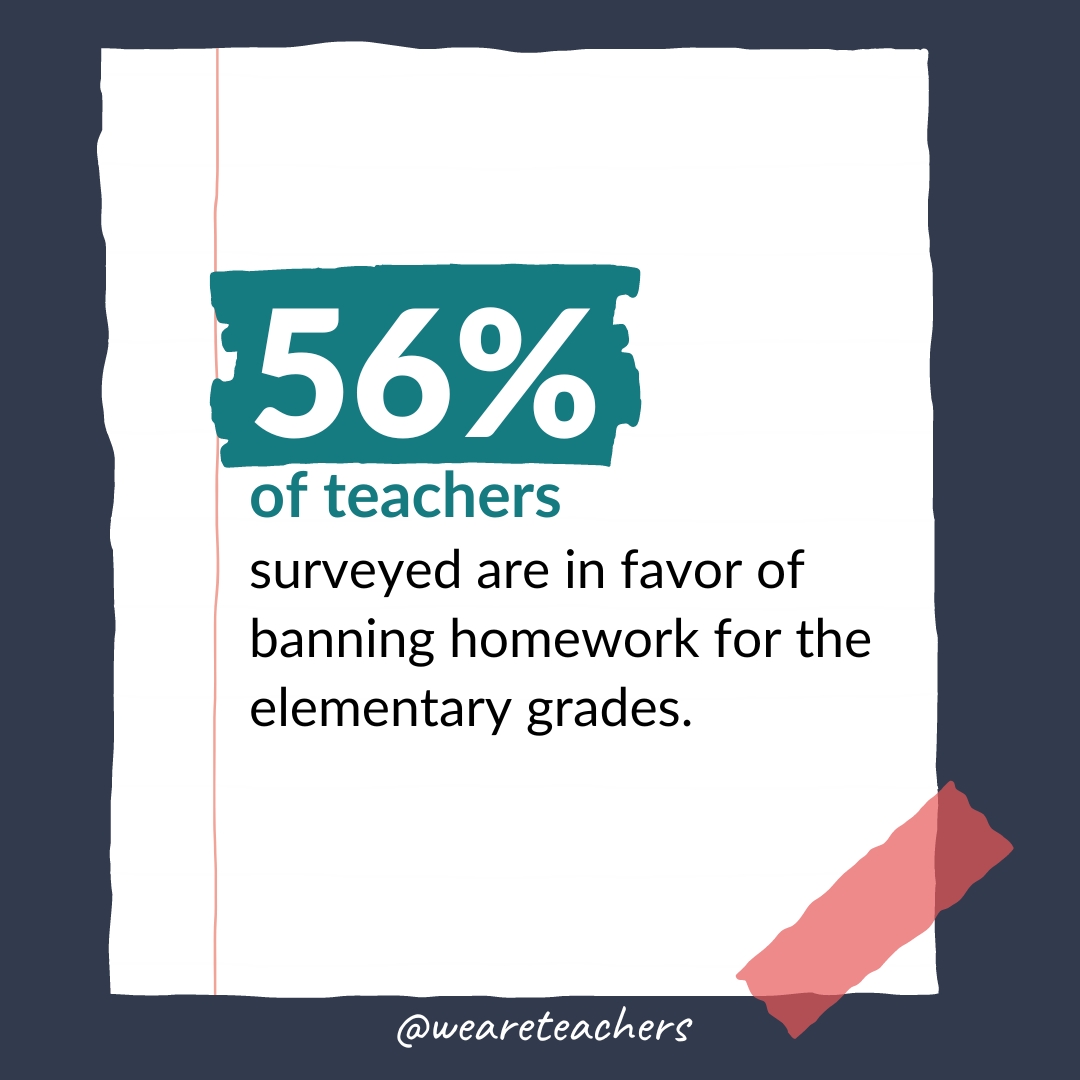
- “The common push for homework in elementary schools is ‘to prepare them for high school.’ That’s overreach. The elementary child’s job is to be an elementary child. We need to teach children where they are.” —Lauren Anderson
- “In elementary school, there should be a mixture of homework and unhomework activities. For example, a homework menu with a list of activities to complete for the month or for the week: Read in pajamas for 20 minutes, complete 3 math sheets, help cook dinner, have a family movie night, write your first and last name 10 times, help pack your snack, etc.” —Desiree T.
- “No homework should be part of the teacher motto—work smarter, not harder. Teachers spend too much time grading homework. I believe teachers and students should commit to making every minute count in the classroom so everyone can go home and just be with family.” —Jennifer N., 5th grade teacher
- “Students are learning new concepts. There is not a guarantee that someone will be able to help them with these tasks. Practicing incorrectly is worse than no practice at all.” —High school resource specialist
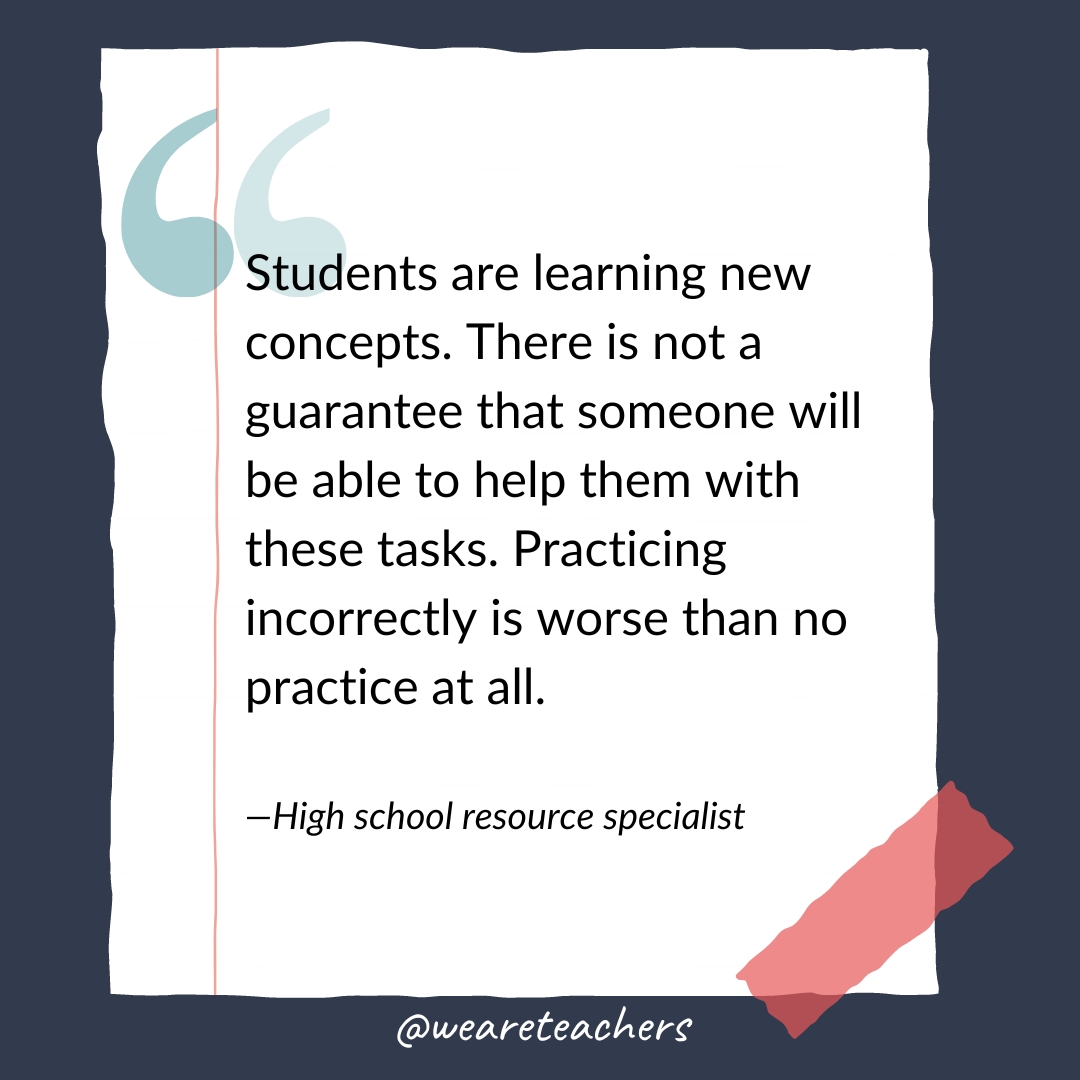
- “Kids should be encouraged to read [at home] and spend time with families and friends.” —Elementary English language development teacher
How much homework is enough (or too much)?
If we agree that that answer to “should we ban homework altogether” is “no,” then how much homework is reasonable? The answer seems to vary by grade level, as you would expect. But many point out the need to focus on the quality of homework over the quantity. And there have been increasing calls to let kids enjoy their longer school breaks without homework hanging over their heads.
What the Research Says
A 2019 study showed that teenagers have doubled the amount of time they spend on homework since the 1990s. This study found that teens spend about an hour a day doing homework on average, which many would argue isn’t unreasonable. But in another study, kids self-reported doing an average of three hours of homework a night, which seems a lot more significant.
The National PTA and the NEA recommend kids do about 10 minutes of homework per night per grade level. In other words, a 3rd grader should do 30 minutes of homework. A 12th grader would do 120 minutes, or two full hours.
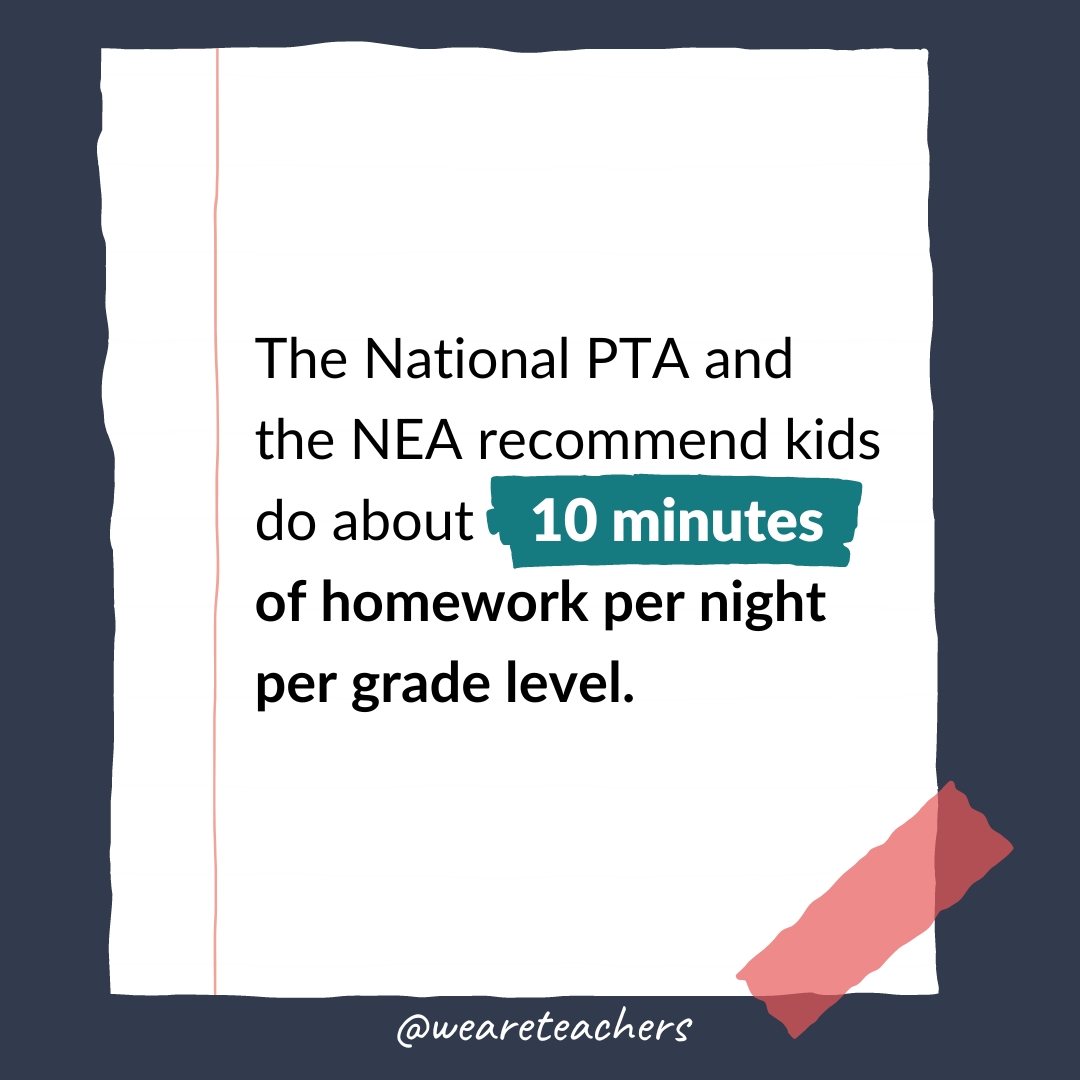
Perhaps more important than “How much homework?” is “What kind of homework?” Meaningful practice of what kids learned in class that day can be helpful. Busywork is not. And assigning really difficult work for kids to tackle at home, without any help from a teacher or other expert voice, is likely to simply frustrate them. Unfortunately, most teachers don’t receive training on how to assign homework that is meaningful and relevant to students. This is another area where we really need to consider a major culture shift.
What Real Educators Say
While 75% of those surveyed say homework has some value in the upper grades at least, most feel it shouldn’t be excessive. Teachers stressed that it should never be used as punishment. Plus, it’s important to remember not all kids have the same access to help and resources outside the classroom.
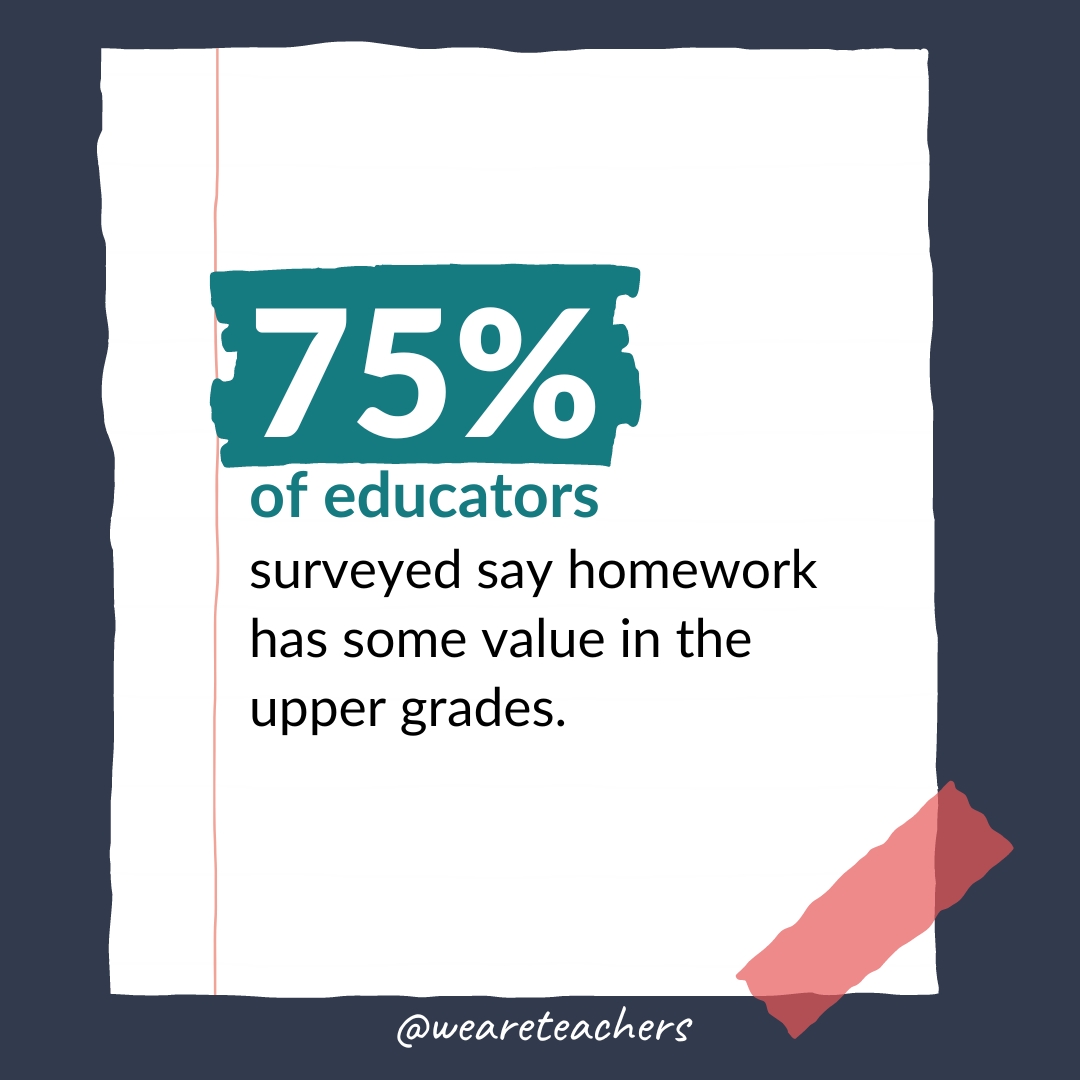
- “Homework is important but I also believe it shouldn’t exceed 30-60 minutes a night.” —Desiree T.
- “I do think elementary students should practice their reading and maybe 10 minutes of math [at home]. That may look different for each child due to how long it may take them to complete something.” —Wisconsin elementary special education teacher
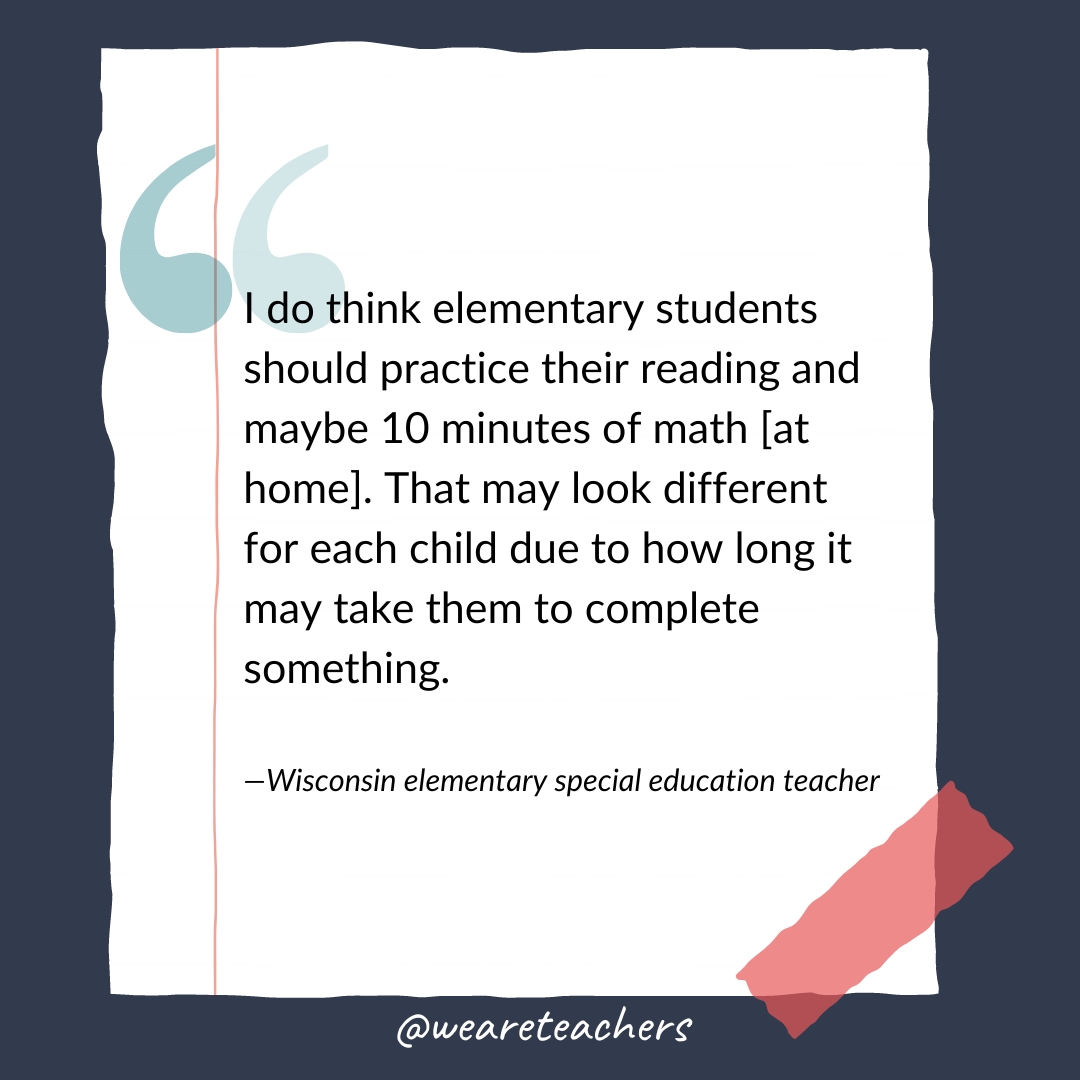
- “Elementary students are not too young to have homework once or twice a week. More than that would be too much.” —Tanya T., HS ELA teacher
- “In order to prepare students for high school, I feel 20-30 minutes of homework is okay [in elementary school].” —Florida 5th grade teacher
- “A ton of homework in every subject is ridiculous. But having to read parts of a book or an article and do several math problems should not be burdensome. And the benefit of those two things has been documented.” —Teresa Rennie, Pennsylvania 8th grade teacher
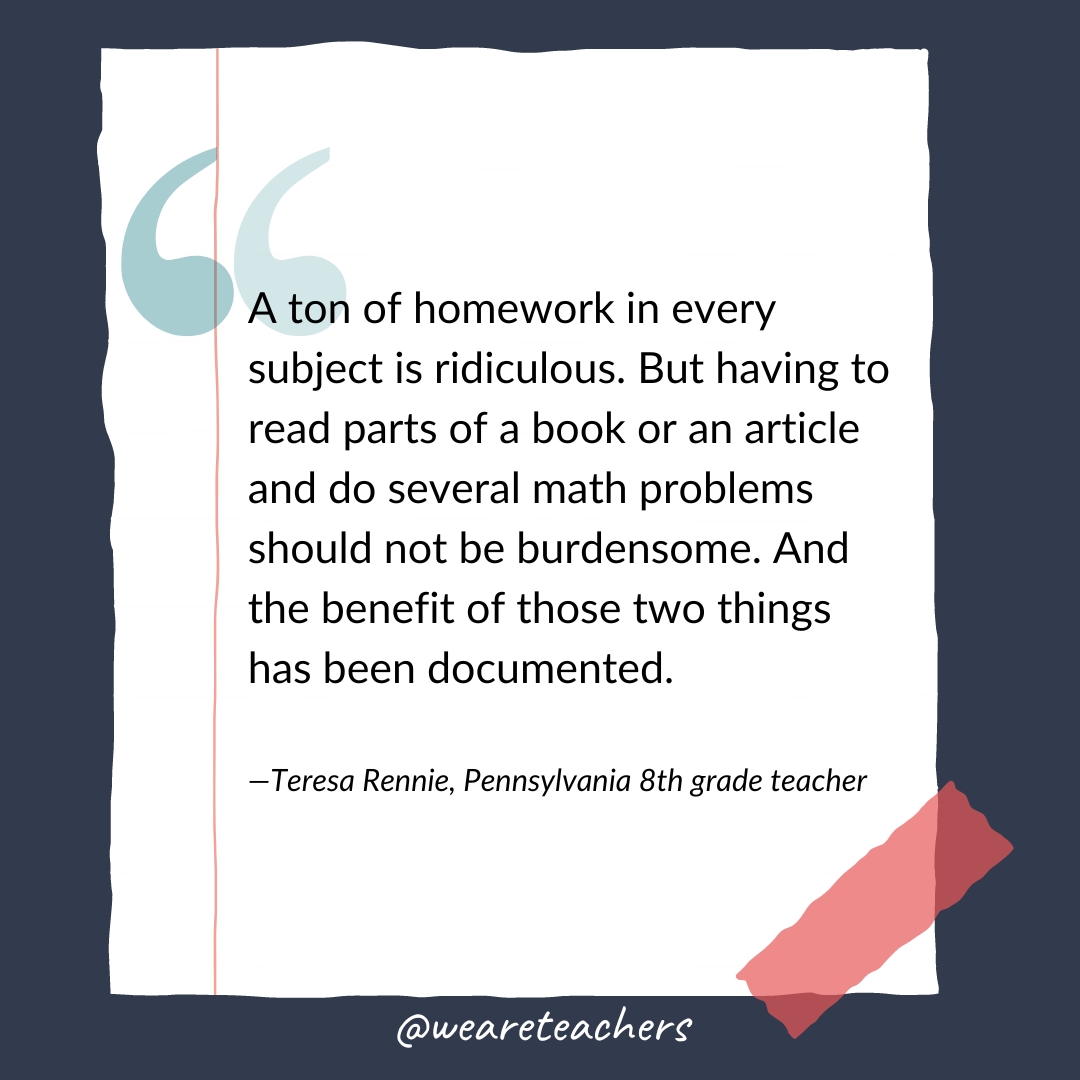
- “I encourage my elementary students to read a little every day to develop a love of reading.” —Meenal Parikh, Ohio 1st grade teacher
- “I think some homework is reasonable. Should it be a hindrance to other other activities or a major inconvenience? No. Some is good, but it doesn’t need to be an every-night thing.” —Patrick Danz, Michigan high school ELA teacher
Are there benefits to less (or no) homework?
Some schools have already banned homework, both in the United States and around the world. In April 2024, Poland enacted a homework ban for students in grades 1 through 3. In grades 4 through 8, homework must be optional and can’t count toward a student’s grade. Finnish schools are famous for assigning less homework at all ages, yet continuing to score highly in international rankings. So what are the benefits of freeing kids from homework?
What the Research Says
Prioritizing mental health is at the forefront of the homework ban movement. Leaders say they want to give students time to develop other hobbies, relationships, and balance in their lives. When two Utah elementary schools officially banned homework, they found psychologist referrals for anxiety decreased by more than 50%.
In some cases, less or no homework can even have a positive effect on academic outcomes. One high school math teacher dramatically reduced the number of practice problems he asked his students to tackle at home. He also decreased the impact of homework on grades (from 25% to 1%). Now kids had more time to spend on just a few practice problems, and they weren’t stressed about getting them wrong. The result of changes like these? Higher standardized test scores on average.
Some schools have experimented with extending the school day in exchange for eliminating homework. This ensures that kids have more time to do independent work while also ensuring access to expert assistance. After all, not all parents have the time or ability to help with homework. And Internet access isn’t a given in every household. Keeping schoolwork at school means giving all kids equal access to the resources they need.
What Real Educators Say
Teachers worry that kids who spend too much time doing homework are losing out in other areas. They want younger students to have more time to play. Older kids should be able to decompress after spending hours in the classroom. And everyone deserves more opportunities for family time and extracurriculars.
- “The stress and time surrounding homework is unnecessary. Jobs don’t require you take work home so school shouldn’t either. If a kid needs to work more, school could reach out with extra help, but homework is a waste of time. Home is for family time.” —Stephanie G., Maryland 1st grade teacher
- “Homework creates an equity problem. Not all learners have access to the same environment or supports at home as they do in school. The students who have supportive parents and resources (tutors, etc.) will succeed, while others will be penalized.” —Illinois high school teacher
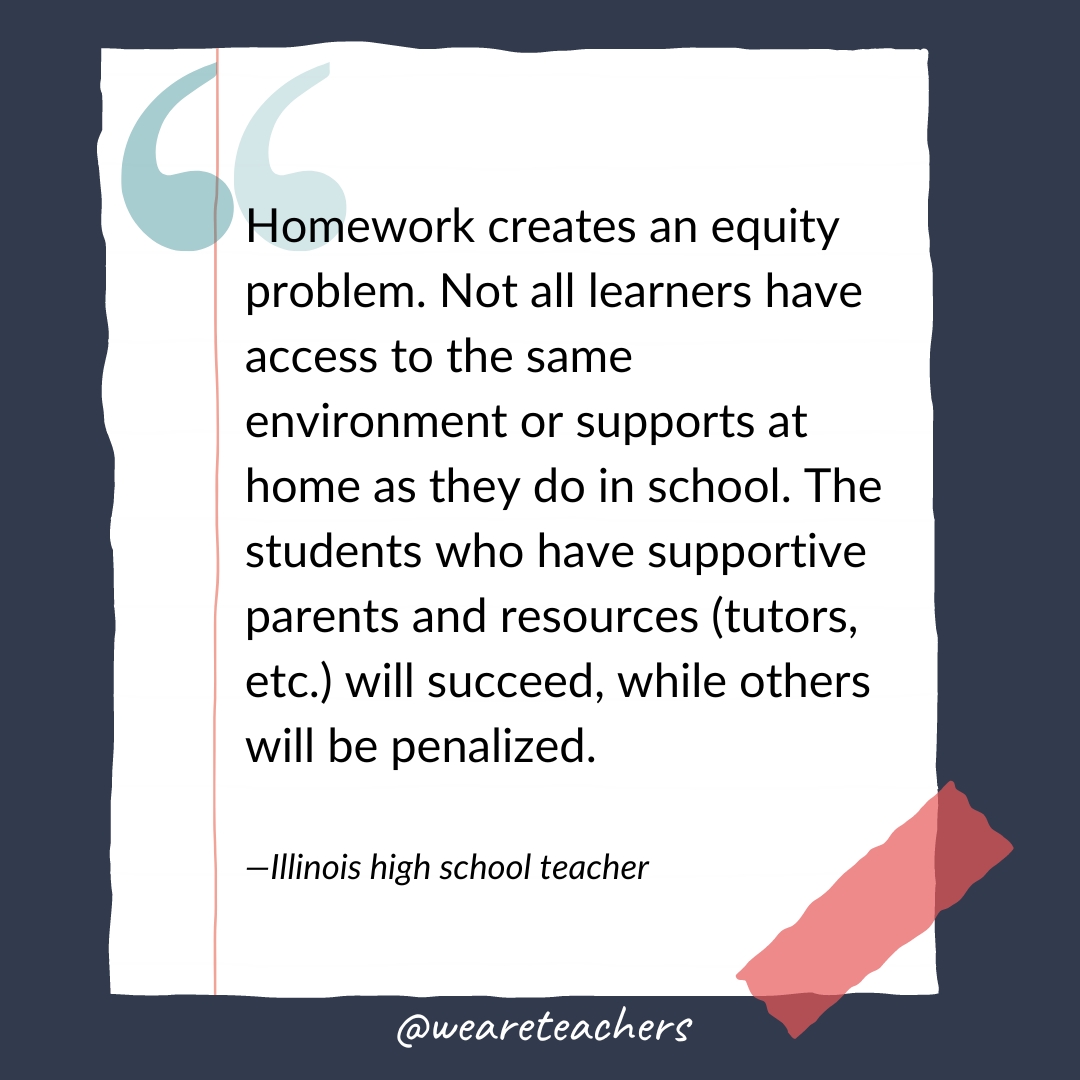
- “If they work at school, they don’t need to work at home. We’re teaching them that it’s okay for someone to tell them how to spend their off-time. School is their job. I don’t like working for free; why should they think that it’s okay?” —North Carolina 1st grade teacher
- “After-school programs, sports, and unstructured play is MUCH more meaningful and impactful for these generations of students.” —Lauren Anderson
- “There are other ways to teach children responsibility and time management than completing homework that will most likely be ungraded.” —4th grade social studies teacher
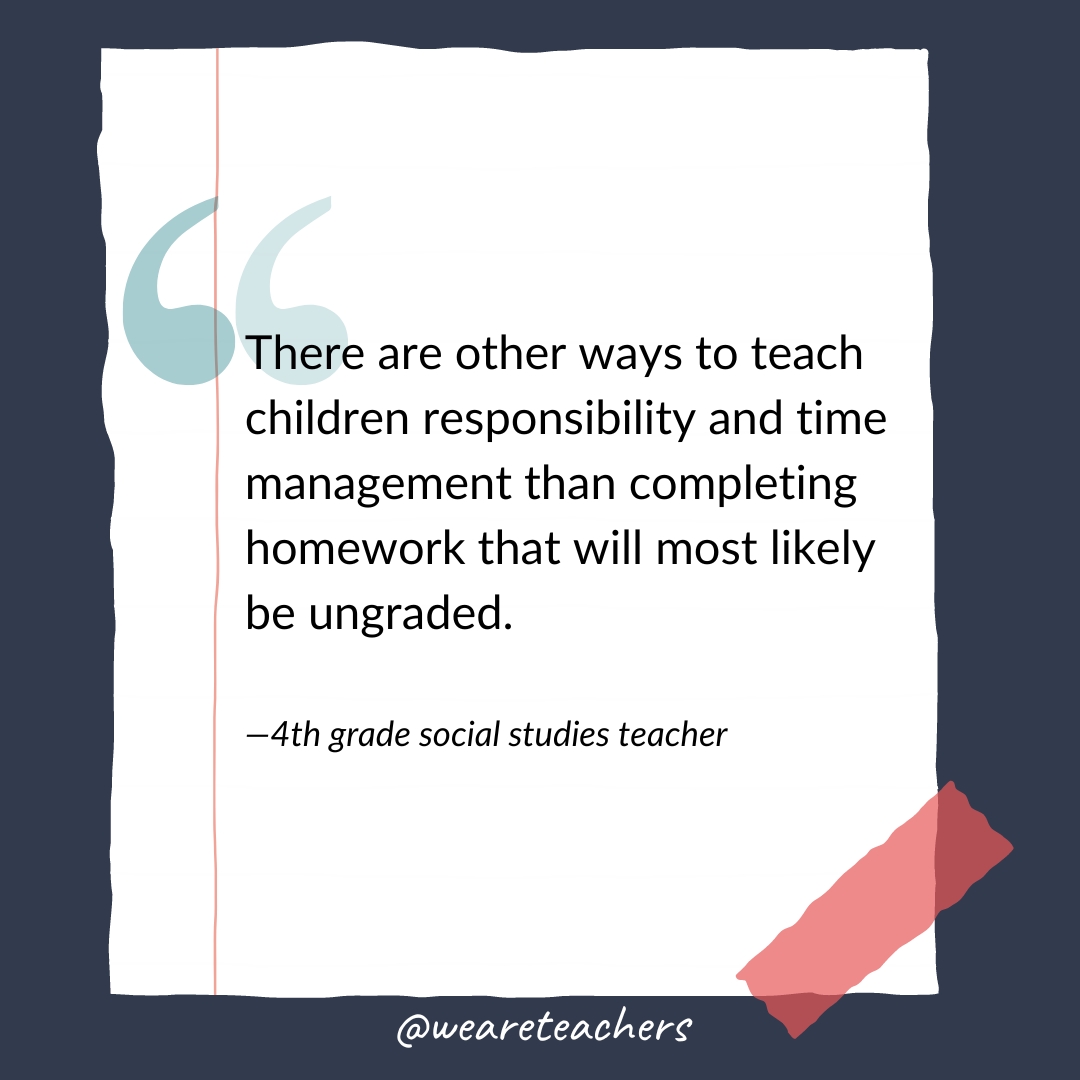
One Teacher’s Take on the Value of Homework: More Cons Than Pros
One 4th grade social studies teacher from North Carolina shared their thoughts with us in detail. We felt they were worth sharing with a wider audience. (Note: We’ve edited and condensed their words for space and clarity.)
Homework Hurts Families
“There are multiple factors that work together that make homework detrimental to students and their families. Children need to spend time with their parents building relationships of trust and respect. It is difficult because during the limited time families have together, they are forced by the schools to give that up to deal with homework.
“Many parents are unable to answer homework questions to help their children as methodology has changed and evolved. Homework becomes a stressful battlefield. Children with ADHD, autism, and other challenges have such a difficult time keeping focus at school. When they have to do additional work at home, there are increased meltdowns and battles, putting further strains on families.”
Homework’s Time Cost
“Children also have less time to complete work at home due to how overscheduled families have become. Children as young as 3rd grade arrive home from their games as late as 10:00 at night. That is often their first opportunity to sit down to complete their work. When they come to school the next day, they become irritable, unfocused, frustrated, and unable to quickly grasp new material.
“In older grades, teachers don’t plan together and don’t understand how much is required of the student to complete each night. If a high school student has six classes and each teacher assigns only 30 minutes of homework each night, that adds up to three hours. I hear of many teachers that each give an hour each night. I don’t see how it is possible for a high school student to complete six hours of homework every night.
“The additional stress of homework for the teacher, students, and families is not worth it. Give families time to spend together, and free up teacher time by not having to hunt down missing work and reviewing what they are not grading. Allow children to have a better bedtime and avoid meltdowns at home, which lead to additional stress, anxiety, and depression.”
